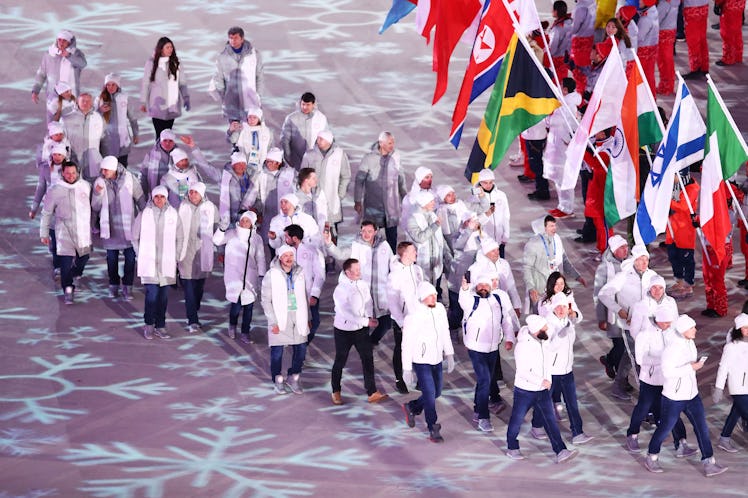
This Is The Reason You Didn’t See Russia’s Flag At The 2018 Olympics Closing Ceremony
The 2018 Winter Olympics officially concluded with the closing ceremony in PyeongChang, South Korea on Sunday, Feb. 25. Similar to the opening ceremony, there was a procession of the flags representing the nations that competed in the games, but you might have noticed one country whose athletes didn't have a national flag to call their own. So, is the Russian flag at the 2018 Olympics closing ceremony?
No, the Russian flag did not fly during the closing ceremony of the 2018 Winter Games. The difficult decision to keep in place the ban of Russia's Olympic team came after a vote by the International Olympic Committee (IOC) mere hours before the closing ceremony on Sunday. According to NBC News, the IOC ultimately voted not to lift Russia's Olympic ban that was instated after the 2014 Sochi Winter Olympics since there are also two new cases of alleged doping by Russian athletes during the 2018 PyeongChang Winter Games.
The ban was originally instated in 2014 after the Sochi Winter Games when Russia's sports ministry allegedly procured 100 urine samples in an effort to hide their athletes' prohibited steroid use.
With keeping Russia's Olympic ban, the decision about whether or not the Russian flag would fly was made. As long as the ban is upheld, the athletes from Russia cannot compete for Russia. Instead, eligible Russian athletes who didn't mess with steroids competed throughout the 2018 Winter Olympics as Olympic Athletes from Russia (OAR).
During the opening ceremony, prior to the start of the games, the Olympic Athletes from Russia were represented under the IOC flag.
Even though all the athletes competing as OAR were deemed steroid-free by the IOC, a couple issues arose during the 2018 Winter Games. There were two instances of OAR athletes who tested positive for banned substances.
25-year-old Russian curler Alexander Krushelnitsky, was stripped of his bronze medal after testing positive for a banned substance called meldonium. There is an ongoing investigation into the matter as Russian curling officials believe that the meldonium, a heart medicine that increases blood flow and boosts stamina, might have been slipped in Kruschelnitsky's food or drink by a rival athlete or one of Russia's political enemies.
30-year-old Russian bobsledder Nadezhda Sergeeva tested positive for trimetazidine, which a banned stimulant heart medication, per Reuters. Even though no medals were affected (since Sergeeva and her teammate landed in 12th place in the bobsled competition), the Russian Bobsleigh Federation addressed the issue on its official Facebook page on Friday, Feb. 23.
A translation of the post from Russian to English reveals that they understand the grave importance of competing without steroids and how testing positive for banned substances can affect all the Olympic Athletes from Russia. It read:
The Bobsleigh Federation of Russia and the athlete herself understand the extent of their responsibility and understand how what has happened can have an impact on the fate of the whole team.
It's these instances of OAR testing positive for banned substances that gave the IOC pause about lifting the ban on Russia's Olympic team.
It does seem to be that Olympic Athletes from Russia testing positive for banned substances at the 2018 Winter Games is the exception rather than the rule. Furthermore, many OAR teams and individuals found great success at the 2018 PyeongChang Winter Games.
They may not have had a Russian flag to call their own, but even without it, teams like the OAR men's hockey team nabbed a gold medal on Sunday in PyeongChang (Saturday night in the United States).
15-year-old OAR figure skater Alina Zagitova added to the OAR gold medal count when she earned the top spot in her ladies free skate program on Friday, Feb. 23 in PyeongChang.
So, even though most of the Olympic Athletes from Russia competed clean throughout the 2018 Winter Olympics, a couple of hiccups prevented the IOC from lifting the ban on Russia's Olympic team. As long as the ban is in place, athletes from Russia cannot represent the Russian flag.